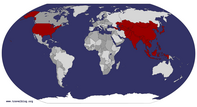Advertisement
Published: March 14th 2009
As I described in an earlier entry, when the English 1 students were given an exam last week, there was a huge range of skill level demonstrated. Teasing out the reasons for that is difficult: are the teachers teaching well? Are the kids placed in the correct level of English? Are some children absent so often that they cannot keep up? Are the students so unfamiliar with the concept of an exam that they literally didn’t know how to answer the questions on paper?
The Cambodian style of teaching appears to involve a lot of rote recitation and call-and-response between teacher and students. The kids aren’t used to doing a lot of writing in their notebooks - paper is a precious commodity, so things are often done on the chalkboard. There is no copier at the school, so there are no “worksheets” or other opportunities to easily practice filling in missing letters or answering questions on paper. The kids can carry on a simple introduction and “conversation” in English, as long as you don’t stray from the script.
“Hello.”
Hello, teacher. “How are you?”
Fine, thank you. How are you? “I’m fine, thank you. What is your name?”
My name is Sopheap. What is your name?
“My name is Jessica.” Etc., etc.
Once you’ve reached the end of their repertoire, they smile at you shyly and the “conversation” is over. They are excellent mimics, however, and will often repeat random things back to you.
Because they had such trouble with the exam, Lori asked us to focus on the exam itself as a teaching tool, to teach them what is expected of them when they take it again in a few weeks. So our amateur teaching careers began teaching the test.
The first item on the test was to write the alphabet. A few letters were already filled in (a _ _ _ e_ _ ...) to prompt them, but some never got more than a handful of letters filled in. We divided the class of 40 kids into three ability levels based on their test performance and split them up, with Jaz and I each taking one group and the third group staying with Neil, another volunteer teacher. We practiced writing letters. We practiced the especially tricky ones a little more. We practiced them on the board and we practiced them in their notebooks. (We
had the pleasure of passing out new notebooks and new pencils at the start of class.) Then I wrote on the board:
a _ c _ e _ f…etc. and had them take turns coming up to fill in the missing letters. Then I wrote it put in fewer letters and more spaces to make it a little trickier. Then we divided into teams and I wrote it on the board twice to see which team could fill it in the fastest and most accurately. (They
love competition!) The kids were game to do all this, but it was plain to see that some kids got it and could write most letters without looking, and some kids didn’t really get it at all, and some might know how to
say the letter coming up next but couldn’t write it.
None of this is surprising given that the regular English teachers at Tchey school have 35-40 students in their classes, ranging in age from 9-14 years old, some of whom have long absences related to illness or their family’s need for them to work or help at home. Looking at the little paperback English textbook they teach from, it strikes
me that if you had a group of 8-10 kids who came to class every day, you could breeze through the book in 2-3 months. Instead, the teachers are halfway through the book after 4-5 months and clearly some kids are completely lost.
And yet they come to class, which is purely optional, and sometimes they even volunteer to come to the board and write. (They never refuse if you ask them to.) Another dozen kids stand in the doorway or windows and watch the whole class, occasionally even calling out answers. Of course, we are a novelty - the big, sweaty, white teachers! - so there may not always be such an audience.
On Neil’s last day after two weeks of volunteer teaching, he hoped to arrange to bring ice cream for all the English students. The logistics, as you might imagine, were daunting. How could he bring 80 servings of ice cream on a tuktuk in the 100-degree heat where it would have to stay frozen for 2+ hours before being served? Despite his best efforts, the plan couldn't quite work. Instead, Lori arranged what she knows to be a big hit with the kids -
200 fresh baguettes and a couple dozen cans of sweetened condensed milk. The milk is poured into bowls at each desk and each kid is given a baguette to dunk in the milk. The extra baguettes don’t go to waste - the kids can really pack the food in. As Lori pointed out, ice cream may be a nice treat, but the kids love this just as much, and appreciate something a bit more filling.
When Ponheary was doing her own thing, pre-PLF, in supporting a few rural school kids, she chose which kids to support by visiting a school, assembling the children, and asking which ones had not eaten that day. The follow-up question was “Which of you did not eat yesterday?” Those were the kids she sponsored when funds allowed.
I work in a job that exposes me every day to “poverty” in America, which cannot compare to the poverty here. Here, people run out of food, and there is no Chittenden County Emergency Food Shelf to turn to, no food stamps, no WIC program to deliver milk and eggs and cereal to supplement your children’s nutrition. Here, people get sick and if there is no
transportation to a provincial hospital, there is no medical care at all. A fall from a tree can result in a child’s broken leg that will never be treated and will cause permanent disability. A bout of dengue fever or malaria or diarrhea can kill a child for lack of simple treatment. A high fever or repeated ear infections can cause deafness. A child born with a birth defect may not be well cared for, or may be immediately buried - his deformity puts his siblings at risk due to the extra care he might need and his inability to contribute to the family. In the most rural areas of this country, a child has a one in four chance of dying before her second birthday.
So education may not always rise to the top of the list of things that can be attended to - survival will always take precedence. And if a child’s labor is needed to help support the family, then working is more important than school. And if parents need to have seven children in the hopes that five of them will survive to adulthood and support the parents when their bodies are too worn out to work any more at the age of 40, then so it will be. And while we may see some of this as short-sighted, survival mode rarely allows the luxury of having the long-term view. It’s about
NOW. How to eat NOW. Where to sleep NOW. Not next month or next year.
The project Jaz is doing with some of the Wat Bo students also relates to long-term/short-term perspective: they're trying to leartn about the sustainability of tourism at Angkor Wat. The children see tourists as only a good thing - they bring money and jobs into the community, and the kids have no sense of the damage being done by tourism and what the long-term impact could be. (I’m told that their parents have no better sense of it themselves.) What is the impact of luxury hotels using up resources such that the water table drops and Angkor Wat begins to sink? How long can the ancient temples tolerate being climbed upon before they are worn away by an army of 4 million Keen-clad feet? How many millions of discarded plastic bags will the Siem Reap River hold before it chokes the last fish?
It feels like a different manifestation of the same issues that poverty-stricken people at home face every day. Why not spend money on cable TV - it provides short-term escape from the reality of your long-term situation, which you feel helpless to change. And here, why not keep your kids home from school to work the fields, when the need to eat tomorrow is more immediate than anything else? And it presents the same dilemmas we talk about at home in terms of how to give people the opportunity and teach them the skills required to have a long-term view, which is the set of skills they need to get out of the cycle. How do you teach critical thinking? How do you help people envision their future and imagine that they have any control over it? No easy answers, but plenty of hard questions.
But really, it will still be hard to come home and listen to clients complain about having their cable TV shut off for lack of payment. I’ll bite my tongue and try to remember that poverty is relative, to some degree, and being poor in America carries more shame and more reminders about how inadequate you are, thanks to being bombarded by messages about what you
should have, but don’t.
Enough of my poverty soapbox. (For now.) Sorry if this entry is a bit less amusing than some others, but the realities here shouldn’t be overlooked, and I want you to have a more complete picture of this place. If anyone of you feel motivated by this to help or contribute in some way, let me know. I’ll gladly point you in the right direction.
Advertisement
Tot: 0.461s; Tpl: 0.012s; cc: 9; qc: 55; dbt: 0.0916s; 1; m:domysql w:travelblog (10.17.0.13); sld: 1;
; mem: 1.2mb












dad
non-member comment
sad
Hi, Typical of you, you're not saying how difficult and frustrating the work must be. Hard work you're doing, that includes Jaz and all the volunteers. So sad the state of affairs for those children and families. I had to wipe away tears to continue reading. I will be there with you someday to contribute to the work. Thanks. LOVE, me